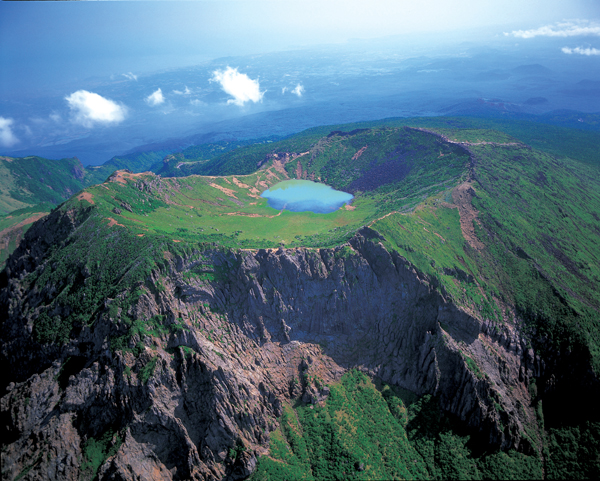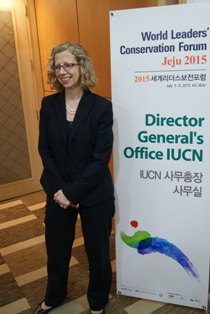| |
 |
|
| ▲ IUCN chief said ecosystem wealth must be measured. Photo courtesy Jeju Special Self-Governing Province |
Inger Andersen, director general of the International Union for Conservation of Nature (IUCN), said on Tuesday that understanding the value of ecosystems to national wealth was “the next barrier” for conservationists to “break through.”
“The air that we breathe, the pollinators, the bees that pollinate our crops, the clean water we drink, these are services that nature provides to us that we often do not value, and yet the kind of returns that these services have [is incredible].”
Would developing metrics for “measuring and valuing natural capital” — as Andersen recently advocated — overly commodify ecosystems?
“I’d like to turn it on its head. Not understanding the services that you and I — the air you breath — not understanding [that] is actually undervaluing the appreciation of nature ... and not actually understanding the critical issues and critical services that nature provides.”
“So it is not about commodifying nature, to the contrary, it is about understanding that the pristine areas of our world provide an absolutely critical service to the lives that we all aspire to,” she said.
Such a perspective still leaves room for the intrinsic value of ecosystems in religious and cultural terms: “one doesn’t deny the other,” she added.
Jeju hosts conservation leaders
Andersen was speaking to The Weekly at the World Leaders’ Conservation Forum, ICC Jeju, held July 7-9. The event followed the World Conservation Congress 2012, held on Jeju, and provided a platform for conservation leaders to share best practice from around the world.
In addition to its multiple environmental designations, including World Natural Heritage, Jeju has taken a leading role in corralling conservation leaders in recent times, including the May IUCN workshop on conservation site management as arising from the Jeju Declaration.
It is also seeking designation as a world environmental hub (which could be confirmed next year at the WCC 2016 in Hawaii) and Andersen said that Jeju, despite room for improvement, is attuned to the wealth of clean ecosystems and is a good example of a community that “has decided that restoring and conserving nature has a much greater value than not doing so.”
“[Jeju is] an island dependent on tourism for its income and, therefore, understands with more depth how cleaner, greener surroundings and growth can lead to a higher and better quality tourism sector with a higher income.”
She added that it is often local governments that play this important role as they have the freedom to be “path setters” and are more innovative.
| |
 |
|
| IUCN director general Inger Andersen says bold and brave steps are needed for the environment. Photo by The Jeju Weekly |
No room for apathy
Taking a broader view, the conversation then touched on potential public apathy in the face of seemingly insurmountable hurdles such as what has been termed a new extinction phase, as vertebrates vanish at 114 times the normal rate.
Andersen said we all have a duty to make changes in how we live, and we should feel empowered to do so as it is “not something that individual action at the local level cannot turn around.”
“There is a species crisis ... but then we have to ask why, and — of course — it is human action that is causing this. And that means that there is no need for apathy. To the contrary, if it is human action there is everything we can do about it, as through action we can turn it around.”
Nature as peacemaker
And nature can turn itself around surprisingly quickly, as seen at sites of conflict where human actions have been minimized.
There is a certain irony in the most destructive period in modern Korean history — the Korean Civil War 1950-53 — also being nature’s biggest boon through the creation of the DMZ.
The 250km-by-4km corridor between North and South Korea is potentially fatal for humans, but it provides a haven for more than 1,200 varieties of plants and thousands of animal species, including the Asiatic black bear and Amur leopard.
The Forum further advanced talks on establishing a DMZ ecological park and Andersen said this shows the how the “miracle of nature” can bring those in conflict together in peace.
“It offers up an extraordinary gift, a gift that conflict can give towards peace and reconciliation, a gift that nature has granted to us — because we were at war it gives us a gift of peace.
Nature bonds us more than infrastructure ever could, she added.
“Nature is something that any child will enjoy, it is visceral, it is in our hearts and our souls, and it allows us to connect at a whole different level with each other and peace that we aspire to.”
Being bold
The conservation chief went on to state that all the discussions held on Jeju need to be seen as “tributaries to a large river that is never going to stop,” particularly as WCC 2016 Hawaii approaches downstream, where many talks will continue.
With the new Sustainable Development Goals (SDGs) set to be announced in September and the United Nations Climate Change Conference (COP 21) in Paris just a few weeks later, she said it is time to be “bold, brave and robust.”
It is, therefore, no surprise that the motto for WCC 2016 is “planet at a crossroads” as the world begins to “hammer out how this can come together.”
“This is the global project of this century, that all of us living on this earth have to be part of.” |





















